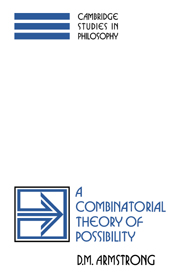2 - Non-Naturalist theories of possibility
Published online by Cambridge University Press: 05 June 2012
Summary
AGAINST THE LEIBNIZIAN VIEW
The view now to be criticized is that, while ours is the only actual world, there do exist, in some sense of the word ‘exist’, merely possible worlds, set in one-to-one correspondence to, indeed constituting, the ways that the actual world might have been. It may or may not have been the view of Leibniz, but it is convenient to call it the Leibnizian view. It involves two levels of existence: the actual and the merely possible.
There exists a strong argument against this view, first stated, as far as I know, by D. C. Williams. It has since been endorsed by David Lewis, who heard the argument from Williams. I was told about it by Lewis.
Williams says:
There is no more thorough-paced philosopher than Leibniz, and the relations of essence and existence are the very crux of his system; yet he tells us almost nothing about Existence except that it is contingent and a predicate, and he half retracts these. He never intimates, for example, how he can tell that he is a member of the existent world and not a mere possible monad on the shelf of essence.
(1962, p. 751–2)- Type
- Chapter
- Information
- A Combinatorial Theory of Possibility , pp. 14 - 34Publisher: Cambridge University PressPrint publication year: 1989

